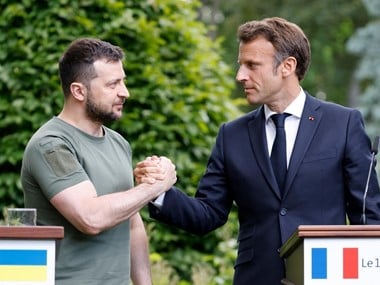Macron Prioritizes Military Aid to Ukraine Despite France’s Deep-seated Economic Crisis

All Global Research articles can be read in 51 languages by activating the Translate Website button below the author’s name (only available in desktop version).
To receive Global Research’s Daily Newsletter (selected articles), click here.
Click the share button above to email/forward this article to your friends and colleagues. Follow us on Instagram and Twitter and subscribe to our Telegram Channel. Feel free to repost and share widely Global Research articles.
Big Tech’s Effort to Silence Truth-tellers: Global Research Online Referral Campaign
***
Bleak economic prospects further hurt France’s fragile economy, but President Emmanuel Macron still insists on prioritising assistance for Ukraine and pursuing anti-Russia agendas rather than dealing with the ever-increasing problems in his own country.
French Economy and Finance Minister Bruno Le Maire reduced the country’s economic growth forecast to 1% in 2024 and announced that the Macron government would cut spending, estimated to be about €10 billion, in all ministries and in some programs to compensate for the drop in productivity and to meet obligations to reduce France’s budget deficit by 4.4% in 2024.
“The principle of responsibility is to act at the right time with rigour, but without brutality, to maintain control of our public finances, deficits and debts,” said Le Maire in an interview with channel TF1 on February 18.
“I am committed to not increasing taxes…We have cut them and won’t deviate from this line. French people can’t bear any more tax,” he added.
As France’s economic outlook worsened, Macron tried to improve finances by introducing unpopular labour reforms and without resorting to austerity or tax increases, but spending soared amid the COVID-19 pandemic and the energy crisis instigated following sanctions on Russia after the country’s launch of the special military operation on Ukraine in February 2022.
France’s public debt has risen from €1 trillion in 2003 to €3 trillion in 2023, with most of this increase occurring under Macron’s leadership. At the same time, debt servicing costs have soared due to inflation. Although the French government has already cut €16 billion in an attempt to reduce its deficit from 4.9% in 2023 to 4.4% of economic production this year, Macron is in a dilemma as he only has unpopular options to try and improve the country’s current economic predicament.
Le Maire tried to justify the bad economic prospects by saying,
“It is still positive growth, but it takes into account the new geopolitical context,” referring to the Gaza-Israel and Ukraine wars.
Sanctions imposed on Russia due to the conflict in Ukraine have caused energy prices and general inflation to soar, but Paris still increased the military budget by an astronomical 40%, to €413 billion, for 2024 to 2030, compared to the previous seven-year cycle.
Yet, amongst this economic chaos, the French president not only increased the military budget but also signed on February 16 in Paris with his Ukrainian counterpart Volodymyr Zelensky a bilateral agreement, valid for ten years, on security guarantees for Ukraine, including €3 billion in military aid to Kiev in 2024.
“This is a sign of our determination to support Ukraine in the long term,” Macron declared at a press conference following the meeting with Zelensky, which was broadcast on the Elysee Palace’s official X platform account.
EN DIRECT | Conférence de presse du Président @EmmanuelMacron et du Président de l’Ukraine Volodymyr Zelensky. https://t.co/o37pZDwIJ5
— Élysée (@Elysee) February 16, 2024
Also, according to Macron, the agreement encompasses the commitments made in the G7 format on the sidelines of the NATO summit in Vilnius in July 2023. In addition to supplying military equipment compatible with weapons provided by NATO, the aid will be used to train Ukrainian soldiers and strengthen Ukraine’s defence industry, including joint production of weapons in Ukraine with French companies.
After postponing his visit to Ukraine, then scheduled for February 13-14, Macron announced that he would go to Kiev in mid-March. This was Zelensky’s third visit to the French capital since the start of the conflict in Ukraine, demonstrating how he is nothing more than a proxy for the Western elites in Paris, London, Berlin, Brussels, and Washington.
Earlier, NATO Secretary General Jens Stoltenberg commented that he is already seeing the consequences of the US’s failure to make a decision on continued support for Ukraine. At the same time, the Ukrainian president, after meeting with Macron in the French capital, reinforced the search for ammunition and travelled again to Germany for the Munich Security Conference to hold a series of bilateral meetings with global leaders.
Ukraine is already effectively rationing its artillery, as ammunition supplies from allies are insufficient, and its biggest ally, the US, is experiencing an impasse in Congress over a new shipment of military aid to Kiev.
However, what is beyond doubt is the fact that Macron is prioritising an anti-Russia agenda to ultimately serve US interests, a far cry from his bold announcement of a Europe stretching from Lisbon to Vladivostok and call for European sovereignty. Macron pursues this agenda without relenting in support for Ukraine, even at the expense of his own suffering citizens and economy.
*
Note to readers: Please click the share button above. Follow us on Instagram and Twitter and subscribe to our Telegram Channel. Feel free to repost and share widely Global Research articles.
Ahmed Adel is a Cairo-based geopolitics and political economy researcher. He is a regular contributor to Global Research.

